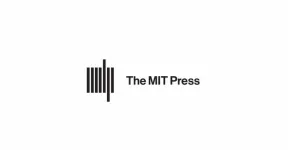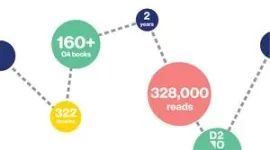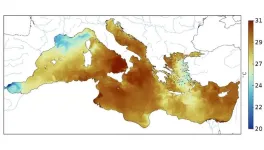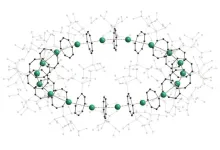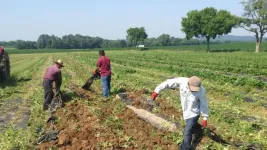(Press-News.org) Thanks to the support of libraries participating in Direct to Open (D2O), the MIT Press will publish its full list (see below) of 2023 scholarly monographs and edited collections open access on the MIT Press Direct platform.
Launched in 2021, D2O is a sustainable framework that harnesses the collective power of libraries to support open and equitable access to vital, leading scholarship. D2O moves scholarly books from a solely market-based, purchase model, where individuals and libraries buy single eBooks, to a collaborative, library-supported open access model. Instead of purchasing a title once for a single collection, libraries now have the opportunity to fund them one time for the world through participant fees.
“With the successful conclusion of our second year of Direct to Open, we are thrilled to make the Press’s complete list of 2023 monographs openly available,” said Amy Brand, director and publisher of the MIT Press. “This achievement comes at a pivotal time for open science, research, and publishing and would not be possible without the partnership and collaboration of D2O member libraries and consortia. Together, we are proving open access scholarship is not only achievable, but sustainable and scalable.”
In its second year, 322 libraries, an increase of 33% from the first year, from around the globe committed to support D2O. Expanding D2O’s international footprint, the Press also entered into all-in agreements with Big Ten Academic Alliance and the Konsortium der sächsischen Hochschulbibliotheken, as well as central licensing and invoicing agreements with Council of Australian University Librarians, Center for Research Libraries; Greater Western Library Alliance, MOBIUS, Northeast Research Libraries, Jisc, Partnership for Academic Library Collaboration and Innovation, SCELC, and Lyrasis.
“When we launched Direct to Open two years ago, we passionately believed that taking action to foster a more equitable, sustainable, and open scholarly communication ecosystem was vital and urgent,” said Amy Harris, senior manager, library relations and sales at the MIT Press. “Success was not guaranteed and has required dedicated, hard work to achieve this year; but we have been truly humbled by the support of all of the participating libraries and our consortia partners.”
In the coming year, the Press will seek to expand library participation in the model. Supporting libraries not only contribute to opening frontlist titles, but also receive exclusive participation benefits including term access to a backlist collection of over 2,400 titles. To learn more about Direct to Open, or to sign-up to become a participating library, visit direct.mit.edu/books/pages/direct-to-open or contact the MIT Press library partnerships and sales team.
List of MIT Press 2023 monographs and edited collections included in the Direct to Open model:
¡Alerta!: Engineering on Shaky Ground by Elizabeth Reddy
Academic Star Wars: Excellence Initiatives in Global Perspective edited by Maria Yudkevich, Philip G. Altbach, and Jamil Salmi
After Eating: Metabolizing the Arts by Lindsay Kelley
Algorithmic Rights and Protections for Children edited by Mizuko Ito, Remy Cross, Karthik Dinakar, and Candice Odgers
Art + DIY Electronics by Garnet Hertz
Athena Unbound: Why and How Scholarly Knowledge Should Be Free for All by Peter Baldwin
Balkan Cyberia: Cold War Computing, Bulgarian Modernization, and the Information Age behind the Iron Curtain by Victor Petrov
The Brain in Motion: From Microcircuits to Global Brain Function by Sten Grillner
Catastrophes, Confrontations, and Constraints: How Disasters Shape the Dynamics of Armed Conflicts by Tobias Ide
Computational Formalism: Art History and Machine Learning by Amanda Wasielewski
Constructing Student Mobility: How Universities Recruit Students and Shape Pathways between Berkeley and Seoul by Stephanie K. Kim
Context Changes Everything: How Constraints Create Coherence by Alicia Juarrero
Cracking the Bro Code by Coleen Carrigan
Creative Hustling: Women Making and Distributing Films from Nairobi by Robin Steedman
Cryptographic City: Decoding the Smart Metropolis by Richard Coyne
Dare to Invent the Future: Knowledge in the Service of and through Problem-Solving by Clapperton Chakanetsa Mavhunga
Data and Democracy at Work: Advanced Information Technologies, Labor Law, and the New Working Class by Brishen Rogers
Data Paradoxes: The Politics of Intensified Data Sourcing in Contemporary Healthcare by Klaus Hoeyer
Demystifying the Academic Research Enterprise: Becoming a Successful Scholar in a Complex and Competitive Environment by Kelvin K. Droegemeier
Design Aesthetics: Theoretical Basics and Studies in Implication by Mads Nygaard Folkmann
Design, Empathy, Interpretation: Toward Interpretive Design Research by Ilpo Koskinen
Distant Viewing: Computational Exploration of Digital Images by Taylor Arnold and Lauren Tilton
Distributional Reinforcement Learning by Marc G. Bellemare, Will Dabney, and Mark Rowland
Evolution "On Purpose": Teleonomy in Living Systems edited by Peter A. Corning, Stuart A. Kauffman, Denis Noble, James A. Shapiro, Richard I. Vane-Wright, and Addy Pross
Evolvability: A Unifying Concept in Evolutionary Biology? edited by Thomas F. Hansen, David Houle, Mihaela Pavličev, and Christophe Pélabon
Exploring and Exploiting Genetic Risk for Psychiatric Disorders edited by Joshua A. Gordon and Elisabeth B. Binder
Families on the Edge: Experiences of Homelessness and Care in Rural New England by Elizabeth Carpenter-Song
Forecasting Travel in Urban America: The Socio-Technical Life of an Engineering Modeling World by Konstantinos Chatzis
From ASCII Art to Comic Sans: Typography and Popular Culture in the Digital Age by Karin Wagner
From Geometry to Behavior: An Introduction to Spatial Cognition by Hanspeter A. Mallot
Global Shifts: Business, Politics, and Deforestation in a Changing World Economy by Philip Schleifer
Gradient Expectations: Structure, Origins, and Synthesis of Predictive Neural Networks by Keith L. Downing
The Infrastructural South: Techno-Environments of the Third Wave of Urbanization by Jonathan Silver
Insolvent: How to Reorient Computing for Just Sustainability by Christoph Becker
Inventing the Working Parent: Work, Gender, and Feminism in Neoliberal Britain by Sarah E. Stoller
Just in Time: Temporality, Aesthetic Experience, and Cognitive Neuroscience by G. Gabrielle Starr
Kids Across the Spectrums: Growing Up Autistic in the Digital Age by Meryl Alper
Living with Algorithms: Agency and User Culture in Costa Rica by Ignacio Siles
Mainstreaming and Game Journalism by David B. Nieborg and Maxwell Foxman
Making Meaning with Machines: Somatic Strategies, Choreographic Technologies, and Notational Abstractions through a Laban/Bartenieff Lens by Amy LaViers and Catherine Maguire
Managing Meaning in Ukraine: Information, Communication, and Narration since the Euromaidan Revolution by Göran Bolin and Per Ståhlberg
May We Make the World?: Gene Drives, Malaria, and the Future of Nature by Laurie Zoloth
Media Ruins: Cambodian Postwar Media Reconstruction and the Geopolitics of Technology by Margaret Jack
Milk and Honey: Technologies of Plenty in the Making of a Holy Land by Tamar Novick
More Than a Health Crisis: Securitization and the US Response to the 2013–2016 Ebola Outbreak by Jessica Kirk
Nature-Made Economy: Cod, Capital, and the Great Economization of the Ocean by Kristin Asdal and Tone Huse
No Heavenly Bodies: A History of Satellite Communications Infrastructure by Christine E. Evans and Lars Lundgren
On Linearization: Toward a Restrictive Theory by Guglielmo Cinque
On the Brink of Utopia: Reinventing Innovation to Solve the World's Largest Problems by Thomas Ramge and Rafael Laguna de la Vera
Open Minded: Searching for Truth about the Unconscious Mind by Ben R. Newell and David R. Shanks
Ownership of Knowledge: Beyond Intellectual Property edited by Dagmar Schäfer, Annapurna Mamidipudi, and Marius Buning
Parody in the Age of Remix: Mashup Creativity vs. the Takedown by Ragnhild Brøvig
The Perception Machine: Our Photographic Future between the Eye and AI by Joanna Zylinska
Person, Thing, Robot: A Moral and Legal Ontology for the 21st Century and Beyond by David J. Gunkel
The Phoenix Complex: A Philosophy of Nature by Michael Marder
Picture Research: The Work of Intermediation from Pre-Photography to Post-Digitization by Nina Lager Vestberg
Picture-Work: How Libraries, Museums, and Stock Agencies Launched a New Image Economy by Diana Kamin
A Place for Science and Technology Studies: Observation, Intervention, and Collaboration by Jane Calvert
Playing Oppression: The Legacy of Conquest and Empire in Colonialist Board Games by Mary Flanagan and Mikael Jakobsson
Principles of Knowledge Auditing: Foundations for Knowledge Management Implementation by Patrick Lambe
Prison Media: Incarceration and the Infrastructures of Work and Technology by Anne Kaun and Fredrik Stiernstedt
Properties of Life: Toward a Theory of Organismic Biology by Bernd Rosslenbroich
Rational Accidents: Reckoning with Catastrophic Technologies by John Downer
Real Life in Real Time: Live Streaming Culture edited by Johanna Brewer, Bo Ruberg, Amanda L. L. Cullen, and Christopher J. Persaud
Recycling Class: The Contradictions of Inclusion in Urban Sustainability by Manisha Anantharaman
Repairing Play: A Black Phenomenology by Aaron Trammell
The Science-Music Borderlands: Reckoning with the Past and Imagining the Future edited by Elizabeth H. Margulis, Psyche Loui, and Deirdre Loughridge
Selling the American People: Advertising, Optimization, and the Origins of Adtech by Lee McGuigan
The Sensorium of the Drone and Communities by Kathrin Maurer
Sewer of Progress: Corporations, Institutionalized Corruption, and the Struggle for the Santiago River by Cindy McCulligh
The Space between Look and Read: Designing Complementary Meaning by Susan M. Hagan
The Stuff Games Are Made Of by Pippin Barr
Tactical Publishing: Using Senses, Software, and Archives in the Twenty-First Century by Alessandro Ludovico
To Know Is to Compare: Studying Social Media across Nations, Media, and Platforms by Mora Matassi and Pablo J. Boczkowski
Undue Hate: A Behavioral Economic Analysis of Hostile Polarization in US Politics and Beyond by Daniel F. Stone
The Unequal Effects of Globalization by Pinelopi Koujianou Goldberg with Greg Larson
The Videogame Industry Does Not Exist: Why We Should Think Beyond Commercial Game Production by Brendan Keogh
A Woman's Right to Know: Pregnancy Testing in Twentieth-Century Britain by Jesse Olszynko-Gryn
War on All Fronts: A Theory of Health Security Justice by Nicholas G. Evans
What Makes Us Social? by Chris Frith and Uta Frith
Winds of Doctrine: Studies in Contemporary Opinion by George Santayana, David E. Spiech, Martin A. Coleman, and Faedra Lazar Weiss
Women and Climate Change: Examining Discourses from the Global North by Nicole Detraz END
MIT Press's Direct to Open (D2O) achieves second year goal, opens access to 82 new books in 2023
With 322 participating libraries and new consortium agreements, the D2O publishing model has now opened access to more than 160 scholarly monographs and edited collections.
2023-08-03
ELSE PRESS RELEASES FROM THIS DATE:
CMS Innovation Center new care, payment model influenced by Eskenazi Health, Regenstrief Institute, IU School of Medicine
2023-08-03
INDIANAPOLIS -- A team including Eskenazi Health, Indiana University School of Medicine and Regenstrief Institute has helped guide a new dementia care and payment model announced by the Centers for Medicare and Medicaid Services (CMS) Innovation Center.
Guiding an Improved Dementia Experience (GUIDE) is the first model established by the Innovation Center that directly addresses the needs of unpaid caregivers, usually family, of individuals living with Alzheimer’s disease and related dementia. The model will provide a comprehensive ...
Scientists warn about decoupling warming trend when detecting marine heat waves
2023-08-03
The climate crisis is severely affecting marine ecosystems around the world and the Mediterranean is not an exception. Marine heat waves associated with this crisis are causing massive mortality events throughout the basin. Given this scenario, their correct definition and characterization become a key element in defining possible future scenarios.
Now, a new study by the Institut de Ciències del Mar (ICM-CSIC) and the Institute of Marine Sciences of the National Research Council (CNR-ISMAR) has revealed how decoupling global warming trends affects the definition of marine heat waves characteristics. ...
On-off switch for enzymes
2023-08-03
Light affects living organisms in many different ways: for example, plants orient their growth direction towards the sun, while circadian rhythms in humans are controlled by daylight. These processes always involve photoreceptors, which are proteins that can sense different colours and intensities of light.
10,000-fold increase in enzymatic activity
Now, researchers at Graz University of Technology (TU Graz) have deciphered the function of a highly efficient photoreceptor. Their findings have been published in the journal Science Advances. The research ...
New-generation geostationary satellite reveals widespread midday depression in dryland photosynthesis during 2020 western US heatwave
2023-08-03
The western U.S., particularly the Southwest, has experienced a notable increase in record-breaking high temperatures over recent decades, with recurring drought and heatwaves. These conditions have resulted in severe consequences for both human and nature systems, including dire water shortages, rampant wildfires, substantial agricultural losses, and increased human mortality. These regions, dominated by water-limited ecosystems, face exacerbated water stress due to more frequent and protracted droughts and heatwaves, which can profoundly impair ecosystem ...
Nanorings: New building blocks for chemistry
2023-08-03
Sandwich complexes were developed about 70 years ago and have a sandwich-like structure. Two flat aromatic organic rings (the “slices of bread”) are filled with a single, central metal atom in between. Like the slices of bread, both rings are arranged in parallel. Adding further layers of ‘bread’ and ‘filling’ produces triple or multiple sandwiches. “These compounds are among the most important complexes used in modern organometallic chemistry,” says Professor Peter ...
Rural environment supports children’s immune systems
2023-08-03
Children raised in rural environments who spend a lot of time outdoors with some exposure to animals grow to have better regulated immune systems than children living in urban environments, a new study has found.
Research led by APC Microbiome Ireland (APC), a world-leading SFI research centre and University College Cork (UCC), has shown that early life immune development is highly dependent on a child’s living environment and lifestyle factors. Researchers say that the immune system needs to learn how not to over-respond ...
Novel proton-conductive membranes for automobile fuel cells
2023-08-03
Fuel cells are compact energy conversion units that utilize clean energy sources like hydrogen and convert them into electricity through a series of oxidation–reduction reactions. Specifically, proton exchange membrane fuel cells (PEMFCs), an integral part of electric vehicles, utilize proton-conductive membranes for operation. Unfortunately, these membranes suffer from a trade-off between high durability and high ion conductivity, affecting the lifetime and performance of PEMFCs.
To overcome this issue, scientists ...
UT extension to help Tennessee farmers navigate labor management
2023-08-03
University of Tennessee Extension and GAP Connections recently received a grant from the Southern Extension Risk Management Education Center to launch a series of workshops across the state to help agricultural producers and agribusinesses navigate the intricacies of labor management.
Tennessee’s labor-intensive farming operations are increasingly in need of agricultural labor options, creating challenges for agricultural employers that have transitioned from readily available family labor to scarce hired labor that ...
More girls started puberty early during the COVID-19 pandemic
2023-08-03
WASHINGTON—The number of girls diagnosed with precocious puberty increased during the COVID-19 pandemic due to potential risk factors such as increased screen time and less physical activity, according to a new study published in the Journal of the Endocrine Society.
The number of girls referred to pediatric endocrinologists for precocious puberty has increased significantly over the last two years, potentially due to the COVID-19 pandemic. Precocious puberty is when children's bodies begin to change into adult bodies too soon. They start to develop physical changes before the age of 8 such as breasts ...
It’s 2023, and coming out is, well, complicated
2023-08-03
In an era of unprecedented LGBTQ2+ visibility coupled with incredible backlash, coming out as a sexual minority can be a deeply ambivalent experience, according to new research.
In a study published in Theory and Society, sociologists Dr. Amin Ghaziani and Andy Holmes conducted in-depth interviews with 52 adult Vancouverites about their experiences coming out over the last five years.
We spoke to Dr. Ghaziani (he/him), professor in the UBC department of sociology and Canada Research Chair in Urban Sexualities, about the findings.
Why were you interested in recent experiences of coming out?
Coming out is about sharing your identity with someone, and it’s an ongoing ...
LAST 30 PRESS RELEASES:
Study: Reported crop yield gains from breeding may be overstated
Stem cells from human baby teeth show promise for treating cerebral palsy
Chimps’ love for crystals could help us understand our own ancestors’ fascination with these stones
Vaginal estrogen therapy not linked to cancer recurrence in survivors of endometrial cancer
How estrogen helps protect women from high blood pressure
Breaking the efficiency barrier: Researchers propose multi-stage solar system to harness the full spectrum
A new name, a new beginning: Building a green energy future together
From algorithms to atoms: How artificial intelligence is accelerating the discovery of next-generation energy materials
Loneliness linked to fear of embarrassment: teen research
New MOH–NUS Fellowship launched to strengthen everyday ethics in Singapore’s healthcare sector
Sungkyunkwan University researchers develop next-generation transparent electrode without rare metal indium
What's going on inside quantum computers?: New method simplifies process tomography
This ancient plant-eater had a twisted jaw and sideways-facing teeth
Jackdaw chicks listen to adults to learn about predators
Toxic algal bloom has taken a heavy toll on mental health
Beyond silicon: SKKU team presents Indium Selenide roadmap for ultra-low-power AI and quantum computing
Sugar comforts newborn babies during painful procedures
Pollen exposure linked to poorer exam results taken at the end of secondary school
7 hours 18 mins may be optimal sleep length for avoiding type 2 diabetes precursor
Around 6 deaths a year linked to clubbing in the UK
Children’s development set back years by Covid lockdowns, study reveals
Four decades of data give unique insight into the Sun’s inner life
Urban trees can absorb more CO₂ than cars emit during summer
Fund for Science and Technology awards $15 million to Scripps Oceanography
New NIH grant advances Lupus protein research
New farm-scale biochar system could cut agricultural emissions by 75 percent while removing carbon from the atmosphere
From herbal waste to high performance clean water material: Turning traditional medicine residues into powerful biochar
New sulfur-iron biochar shows powerful ability to lock up arsenic and cadmium in contaminated soils
AI-driven chart review accurately identifies potential rare disease trial participants in new study
Paleontologist Stephen Chester and colleagues reveal new clues about early primate evolution
[Press-News.org] MIT Press's Direct to Open (D2O) achieves second year goal, opens access to 82 new books in 2023With 322 participating libraries and new consortium agreements, the D2O publishing model has now opened access to more than 160 scholarly monographs and edited collections.
